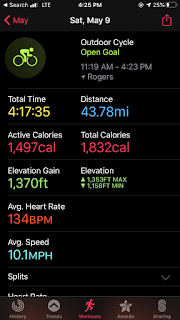How Resistance Training and Cardio Affects Our Metabolism
Recently I went on a beautiful 40+ bike ride with my mom, boyfriend, and my boyfriend's dad. It was so much fun, and I forgot how much I like biking! After the ride, my watch told me that I burned 1,800 calories. I was shocked by the number and started to wonder: how does cardio, a great way to burn calories, affect your metabolism? The answer is actually fascinating and shows how our bodies can adapt and change due to what exercises we do.
As you age, your metabolism starts to slow down since you start to lose muscle and gain fat. This is because testosterone, a hormone that helps build muscle, levels start to decrease in men and women when they are no longer in their "prime". This is part of the aging process as it becomes harder to be as active when you were younger. Having a slower metabolism can be an advantage if you are close to starvation (our ancestors went days without food and survived because their metabolism slowed down) or if you do lots of cardio. However, having a faster metabolism is a sign that you are active, have muscle, eat healthy, and get plenty of rest. Having a faster metabolism makes it easier to burn fat while eating more calories.
Cardio and weight lifting both have amazing benefits for our health, which is why it's suggested to include both in your routine {via}! I personally go on walks, hikes, do HIIT workouts, and of course bike. I lift weights 4-5 times a week and go walking or hiking 6-7 days a week. During quarantine, I have tried to go walking every day in order to get out of the house. Metabolism is the body's way of adapting to how many calories we eat, how much sleep we get, and what kind of exercises we do. It's fascinating that our body can slow down or speed up how quickly we burn calories!
According to Joe Talarico, a certified Precision Nutrition and strength & conditioning coach, cardio is good for burning calories, increasing lung capacity, strengthening the heart, and helping blood flow; however, if you do cardio a lot, over time your body will start to adapt to burn calories slower. Your body will start to burn calories slower so it does not require you to stop and eat to keep doing cardio. This will happen if you do cardio a lot and if you are in a caloric deficit for a long time. Your metabolic rate (the rate at which you burn calories) will slow down so you do not quickly run out of energy {via}.
Think about it! Our bodies slow down how fast we burn energy so we can run miles and miles without a meal. Here is a paragraph from an article by Blaide Woodburn, a personal trainer who has a B.S. in molecular biology.
Metabolic adaption (MA) is the process by which the body alters how efficient it is at turning the food you eat into energy. MA it is an evolutionarily conserved biological process in response to starvation, and this process makes a lot of sense when you look at it through the lens of our prehistoric ancestors. For example, when food was plentiful it meant starvation was not likely. There was no need for the body to store calories as fat for later use, so as many calories as possible were used to fuel regular biological functions such as organ function and maintaining body temperature. But, in times of famine, it was essential that one’s metabolism was extremely efficient, only using the minimum number of calories to maintain biological homeostasis because the rest must be stored as fat for later use to prevent starvation. {via}
If you have a low metabolism, it can be hard for you to lose weight because your body is very efficient at burning calories. It wants to hold on to the calories and store fat. If you have a fast metabolism, your body burns calories faster, which makes it easier to lose fat. So how do you get a faster metabolism? One of the best ways to increase your metabolic rate is to lift weights. This is because when you lift weights, you build muscle which requires more calories to maintain it (you burn more calories while resting compared to someone who has less muscle). It's estimated that 1 pound of muscle burns 6 times more calories compared to a pound of fat at rest {via}. Your body adapts to the stress from lifting and increases the rate at which you burn calories while resting.
 |
| {via} |
 |
| Picture from my bike ride |
Cardio and weight lifting both have amazing benefits for our health, which is why it's suggested to include both in your routine {via}! I personally go on walks, hikes, do HIIT workouts, and of course bike. I lift weights 4-5 times a week and go walking or hiking 6-7 days a week. During quarantine, I have tried to go walking every day in order to get out of the house. Metabolism is the body's way of adapting to how many calories we eat, how much sleep we get, and what kind of exercises we do. It's fascinating that our body can slow down or speed up how quickly we burn calories!
Hope this information was helpful and interesting!




Comments
Post a Comment